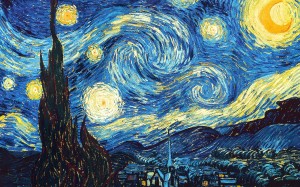 We appreciate creativity when we encounter it in music, art, literature, film, and other areas of life. But why are people creative? The answer from a Christian perspective is rooted in what theologians call the imago Dei--the image of God.
We appreciate creativity when we encounter it in music, art, literature, film, and other areas of life. But why are people creative? The answer from a Christian perspective is rooted in what theologians call the imago Dei--the image of God.
In short, biblically speaking human beings are made in God's image (Genesis 1:26-27; 5:1; James 3:9). This image includes, for instance, human creativity, intellect, and morality. Consequently, the creative impulse is inherent within human nature.
Even if we don't personally see ourselves as particularly creative individuals, the spark of creativity remains, perhaps only needing a nudge in the right direction or a matching of talents with a particular calling. This does not mean that everyone is called to manifest creativity in the fine arts as a way of life, but creativity can serve us in any subject area or career we pursue.
We may pause here and ask, "To what extent does God's image make itself known in human beings? Is the image of God in us destroyed as a result of the fall or is it merely impaired or marred and, if so, to what degree?" These are deep questions theologians grapple with, resulting in differing solutions.
Some are supportive of common grace, which holds that a certain measure of God's grace is extended to all of humanity. Given this viewpoint, the fact that we are all created in God's image, combined with a dose of common grace, results in the potential for creative greatness, beauty, and flourishing in human endeavors from art to literature to philosophy to science and more.
Applied to human creativity it also means that we can learn much from various sources. It does not mean that artistic endeavors or works override biblical revelation, but it does mean that they can contribute to human understanding and even to the glory of God.
How are these ideas practically relevant? They can help us to appreciate wonderful artistry, wherever it is found. Rather than retreating into our own Christian subculture, entrenching ourselves, we can instead intelligently engage and appreciate a variety of ideas, noting areas of great value, but also critiquing ideas that may be creative and intellectually rigorous, yet lacking overall coherence or soundness.
In addition, understanding the image of God and its relevance to life can help us better understand ourselves and, in the case of education, our children. For example, we can read great literature and glean insights from it without undue fear or paranoia. Finally, having an understanding of the image of God can help us better understand and engage the world around us.
A word of caution is in order, however. Although human beings are made in God's image, we are fallen beings, which means that there is also an element of rebelliousness within us--a twisting of our nature, so to speak. This can lead to warped forms of creativity, wherein goodness is spoiled or disfigured.
The broader point, though, is that the image of God in us results in great potential. We have the capacity to create, to reason, and, by God's grace, to flourish.
Robert Velarde
Author/Educator/Philosopher





